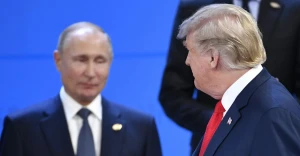
Borrell: Russia uses grain as weapon to create new dependencies in world
Russia is offering developing countries and the G20 cheap grain to create new dependencies, thereby increasing economic vulnerability and global food insecurity
This was stated by the European Union's chief diplomat, Josep Borrell, Reuters reports.
"As the world deals with disrupted supplies and higher prices, Russia is now approaching vulnerable countries with bilateral offers of grain shipments at discounted prices, pretending to solve a problem it created itself," Borrell said.
He called on these countries to speak with a clear and united voice to push the Kremlin to return to the Black Sea Grain Initiative, which allows for the safe export of Ukrainian agricultural products across the Black Sea.
Borrell also called Moscow's actions "a cynical policy of deliberately using food as a weapon to create new dependencies by exacerbating economic vulnerabilities and global food insecurity" and stressed that Russia must stop its attacks on Ukrainian ports and grain infrastructure on the Black Sea and the Danube River.
Russia's termination of the grain deal
On July 16, the last ship loaded with Ukrainian agricultural products under the initiative left the port of Odesa. On 17 July, Russia announced the termination of the grain deal. In response, Volodymyr Zelenskyy said that it was necessary to continue using the grain corridor even despite Russia's withdrawal from the agreement. And Kuleba began urgent consultations at the UN.
The White House condemned Russia's withdrawal from the grain deal, which played a crucial role in reducing global food prices.
On 18 July, Russian presidential spokesman Dmitry Peskov said there were "certain risks" for parties trying to resume the Black Sea Grain Initiative without Russia's participation.
European Commission President Ursula von der Leyen said that it was critical to restore transport links across the Black Sea to provide food to the world's most vulnerable countries and to preserve the ability to export Ukrainian goods.
On 19 July, it was reported that Ukraine was considering transporting food as part of the grain initiative through the territorial waters of Bulgaria and neighbouring Romania.
At the same time, the Russian Ministry of Defence issued a statement threatening ships heading to Ukraine's Black Sea ports.
On July 21, Recep Tayyip Erdogan said he wanted to discuss the extension of the grain deal with his Russian counterpart Vladimir Putin and expressed confidence that it will work again.
On July 22, President of Ukraine Volodymyr Zelenskyy addressed NATO Secretary General Jens Stoltenberg with a proposal to immediately convene the NATO-Ukraine Council due to the security crisis in the Black Sea.
Volodymyr Zelenskyy wrote about his conversation with Stoltenberg on Telegram. It is noted that Zelenskyy and Stoltenberg discussed the implementation of the agreements reached during the Vilnius Summit of the Alliance, as well as further steps towards Ukraine's integration into NATO.
On July 25, the GUR released a report to the Russian leadership, which outlined the technologies used to prevent grain exports from Ukraine, indicating that the "grain deal" was deliberately disrupted.
On the same day, the US State Department, amid the shelling of Odesa and the Danube infrastructure, said that Russia was preparing a false flag operation in the Black Sea on a ship in international waters.
On July 25, Russia laid additional sea mines on the approaches to Ukrainian ports in order to blow up civilian vessels and later blame Ukraine.
On July 26, the UK Ministry of Defense reports that Russia has deployed a modern corvette, the Sergei Kotov, in the southern Black Sea to intercept merchant ships at sea. It patrols the transportation route between the Bosporus and Odesa.
Later, it became known that Russia was preparing aircraft and ships to block the Black Sea, detect and destroy ships.
Russian President Vladimir Putin announces that after unilaterally withdrawing from the Black Sea Grain Initiative, Russia is ready to replace Ukrainian grain and start supplying its own grain to African countries free of charge.
On July 30, during the Sunday Angelus prayer in the Vatican, Pope Francis called on the Russian side to renew the Black Sea Grain Agreement, which allowed Ukraine to safely transport grain. Later, President Volodymyr Zelenskyy said that he considered the Pope's call to Russia important.
On Sunday, July 30, despite the completion of the grain deal, three civilian cargo ships of foreign origin passed the Russian blockade in the Black Sea and anchored in one of Ukraine's grain ports in the Danube Delta.
Southern African countries are trying to convince Russia to return to negotiations on an agreement on the safe export of grain from Black Sea ports, which it abandoned last month.
On August 2, the United States said it had information that Russia was interested in resuming negotiations on the agreement, which ensured safe Black Sea grain exports.
Erdogan also announced an agreement with Putin on a visit to Turkey to discuss the extension of the grain deal.
- News











































